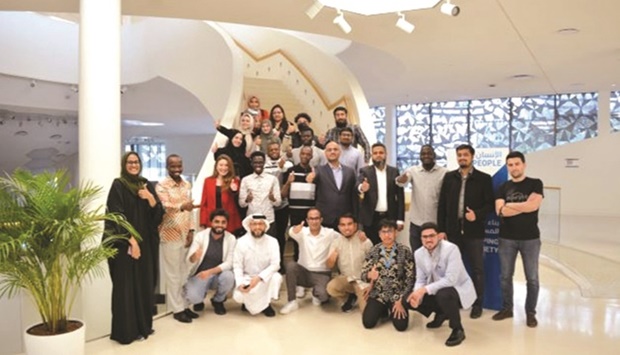Students and researchers from Qatar Foundation universities demonstrated their environmental stewardship at an ideathon on 'Islam, Sustainability and My Carbon Footprint'.
The event was presented by Maker Majlis, a platform under the College of Islamic Studies (CIS) at Hamad Bin Khalifa University, in partnership with Qatargas. It is the first of the college’s strategic collaborations as part of the Qatargas Go Green Environmental Awareness Programme.
The 30 participating students and researchers represented a cross-section of academic disciplines. Adopting an innovative teaching approach, sessions featured sustainability experts, academics, and practitioners in the Maker Majlis network, with HE Dr Mohammed Saleh Abdulla al-Sada, the former Minister of Energy and Industry, delivering the opening remarks.
Qatargas environmental experts interacted with students on the concept of My Carbon Footprint, which aims to provide a holistic view of the impact of individual daily lifestyle choices on human-driven climate change.
During the workshop, CIS students and researchers were given the opportunity to calculate their individual carbon footprint using a specially designed Personal Carbon Footprint (PCF) calculator, which is available on the Qatargas website. The Qatargas PCF Calculator explores the personal carbon impacts of everyday activities such as shopping, water use, waste generation and travel, enabling users to make better informed choices to reduce their carbon footprint.
The programme also featured an inspirational talk about social enterprises and innovation by Leila Mroueh, strategic communications manager, Qatar Foundation.
Presentations by Dr Odeh Jayyousi, an expert in sustainability and innovation, and Dr Evren Tok, assistant dean of Innovation and Community Engagement and associate professor of Islam and Global Affairs, CIS, encouraged participants to connect their Islamic values to sustainability efforts.
Design thinking sessions by Dr Nui Vatanasakdakul, Carnegie Mellon University in Qatar, and Marwen Hijri (UX design) aimed to stimulate creative thinking and innovation. Participants then had the opportunity to activate their learning and exchange ideas on reducing their individual carbon footprint in Qatar during their interaction with Qatargas representatives.
Leading the Qatargas team at the Ideathon, environmental affairs and regulatory manager, Hilal Saad al-Mohannadi, remarked: “Sustaining the highest environment standards and proactively engaging our stakeholders and community to enhance environmental awareness and culture is a key element of Qatargas’ Long-term Environment Strategy. I am very pleased with our engagement with HBKU on the importance of sustainability and its correlation with Islamic values and principles.”
Dr Tok said: “Encouraging students to explore the nexus between Islam, sustainability, and their individual carbon footprint was at the heart of our ideathon. It was exciting to witness them connecting their academic studies with the skills to ideate and collaborate on their individual commitments, but also understand how their ingenuity as social entrepreneurs can address a global challenge.”
CIS faculty members who also participated were Dr Syed Ali, director of the Research Division and the Centre for Islamic Economics and Finance, and Dr Dalal Aassouli, assistant professor and programme coordinator of the Master of Science in Islamic Finance programme.
The 30 participating students and researchers represented a cross-section of academic disciplines. Adopting an innovative teaching approach, sessions featured sustainability experts, academics, and practitioners in the Maker Majlis network, with HE Dr Mohammed Saleh Abdulla al-Sada, the former Minister of Energy and Industry, delivering the opening remarks.
Qatargas environmental experts interacted with students on the concept of My Carbon Footprint, which aims to provide a holistic view of the impact of individual daily lifestyle choices on human-driven climate change.
During the workshop, CIS students and researchers were given the opportunity to calculate their individual carbon footprint using a specially designed Personal Carbon Footprint (PCF) calculator, which is available on the Qatargas website. The Qatargas PCF Calculator explores the personal carbon impacts of everyday activities such as shopping, water use, waste generation and travel, enabling users to make better informed choices to reduce their carbon footprint.
The programme also featured an inspirational talk about social enterprises and innovation by Leila Mroueh, strategic communications manager, Qatar Foundation.
Presentations by Dr Odeh Jayyousi, an expert in sustainability and innovation, and Dr Evren Tok, assistant dean of Innovation and Community Engagement and associate professor of Islam and Global Affairs, CIS, encouraged participants to connect their Islamic values to sustainability efforts.
Design thinking sessions by Dr Nui Vatanasakdakul, Carnegie Mellon University in Qatar, and Marwen Hijri (UX design) aimed to stimulate creative thinking and innovation. Participants then had the opportunity to activate their learning and exchange ideas on reducing their individual carbon footprint in Qatar during their interaction with Qatargas representatives.
Leading the Qatargas team at the Ideathon, environmental affairs and regulatory manager, Hilal Saad al-Mohannadi, remarked: “Sustaining the highest environment standards and proactively engaging our stakeholders and community to enhance environmental awareness and culture is a key element of Qatargas’ Long-term Environment Strategy. I am very pleased with our engagement with HBKU on the importance of sustainability and its correlation with Islamic values and principles.”
Dr Tok said: “Encouraging students to explore the nexus between Islam, sustainability, and their individual carbon footprint was at the heart of our ideathon. It was exciting to witness them connecting their academic studies with the skills to ideate and collaborate on their individual commitments, but also understand how their ingenuity as social entrepreneurs can address a global challenge.”
CIS faculty members who also participated were Dr Syed Ali, director of the Research Division and the Centre for Islamic Economics and Finance, and Dr Dalal Aassouli, assistant professor and programme coordinator of the Master of Science in Islamic Finance programme.

